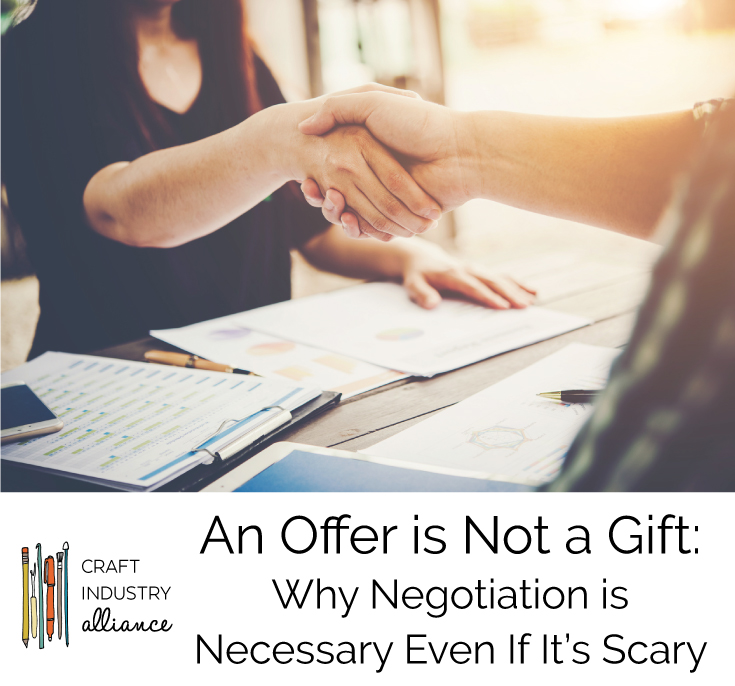
Asking for what you want or need is hard.
In your personal life, that’s called advocating for yourself, whether it’s for more help around the house or saying no to toxic relationships. In your business life, it’s called negotiating. It’s funny that saying no to a friend that is rude or overbearing makes perfect sense, but asking for better terms from a business partner strikes fear in the hearts of even the savviest entrepreneur.
I am a literary agent, so it’s my job to negotiate. I always say that I take care of the business side of things so my clients can enjoy the more personal editorial relationship. And negotiating wasn’t always easy for me, either. When I got my first offers for my first books, I was worried they were going to evaporate into thin air if I waited too long or asked for too much or nitpicked about the tiniest details. Now, after over a decade of negotiating, I’ve learned that none of those things are true. If I didn’t negotiate I’d be doing a disservice to my clients. I’ve never had a deal go south because we asked for too much. Sometimes my clients rejected an offer, sometimes—often—we didn’t get every single thing we wanted from a publisher. But in 99.9% of the book deals I’ve negotiated for my clients, both parties have gotten to a mutually beneficial place, a place where it made sense to go forward with the deal.
Frequently, an author will reach out to me after they’ve already gotten an offer from a publisher. This is common and wonderful. Even if I didn’t submit the book to the editor, I get to help with the most important part: negotiating terms and the contract. But the first question a nervous new client asks is, Will the publisher be mad I got an agent? They think the publisher will be upset that someone is going to come in and ask for more money or higher royalties or what have you. But the publisher is never mad. They have told me point blank they love it when an author gets an agent. It makes everyone’s job easier.
I want to share some truths about negotiating I’ve discovered over the course of my career. These aren’t tactics or tricks, but misconceptions about what your business partner, whether it’s a publisher or a website or a fabric company, is thinking when they propose a business arrangement with you. Maybe it involves money, maybe it doesn’t. If you avoid these assumptions and advocate for yourself, you’re guaranteed to end up with a better deal and maintain a positive working relationship. I promise.
When approaching a negotiation, avoid jumping to these conclusions:
If I ask for something, they’ll think I’m needy, or mean, or a problem client.
This is patently false. The person you’re negotiating with has made offers like yours hundreds of times before. It’s part of their job. They know some work out and some don’t. And they want to work with you as much as you want to work with them. They’re nervous you’re going to say no, too. But you aren’t signing a contract that says you like each other; you’re signing a contract outlining a business deal. Of course you should be kind and professional and courteous. Name-calling and throwing a raging fit is going to sour any relationship. But asking to move a deadline back, or asking for more money or a less restrictive clause is an expected part of negotiation. The company won’t think you’re ungrateful for the opportunity. They won’t think you’re pushy, mean, or hard to work with. They’ll think you understand business and they’ll likely take you more seriously. Asking questions is not a bother; it’s in both parties’ best interests. When you understand the terms better and can thus produce better materials, everyone wins. Do not be afraid to ask for what you need or even what you want. It is a normal part of every business relationship.
They’re probably offering me a good deal.
In the craft world, most companies you deal with are staffed with caring people who love what they do. It’s great and makes for very pleasant business relationships. But, those companies do not work for you. Those editors and producers are employed by a company that is interested in making money by producing a good product. They’re looking for partners and writing contracts specifically to make their company money. If they don’t, they’ll lose their jobs. They are not tasked with making your business grow, your profile bigger, or you more money. They’re looking for mutually beneficial relationships, but again, that contract was not written by a lawyer looking out for your best interests. Those lawyers were hired by the company to protect the company’s best interests. That’s why you must advocate for yourself. The company cannot and will not do it for you. Again, asking for more money, better terms, explanations of unfamiliar concepts is not bothersome or inappropriate. Exactly the opposite! Courteous, reasonable, professional negotiation says to the company I know what I’m doing. I take my business seriously. I’m a professional you want to work with again.
I don’t want to rock the boat.
It is scary to negotiate. That’s a fact. I still get a little nervous when I make a counteroffer for a book deal. If I didn’t then that shows I’m not advocating for my clients in the best way. I want to ask for a little more than I think they’ll give us so we can meet in a nice place in the middle. I don’t go in and demand six figures and a spot in the New York Times Book Review. Of course not. But I do consider what my client needs, what’s reasonable for that kind of book, and what’s industry standard. This is the normal progression of negotiating. It is not “rocking the boat.” It is not being a problematic client. It’s the way business works. If you’re not a little nervous about asking for what you want or need, then you need to ask for more. The worst that will happen is they say no. They’re not going to laugh at you. They’re not going to pull the plug and blacklist you for all future business. If they do, (and this has literally never happened to me in 12 years of negotiating) then they are a bad company you don’t want to work with anyway.
They’ve been good to me, so I should accept what they want.
The counterpoint to negotiation is compromise. And as the president of your business, you get to decide what compromises you’re willing to make to accept a project. You might be willing to do a rush deadline because you love the idea or the venue. You might be willing to take less money because of a fantastic opportunity. But you should not compromise just because a company has been “nice” to you in the past. Loyalty is a wonderful concept in both business and personal relationships, but prizing loyalty above your best interests is a bad business decision. You can’t count on a large corporation to do the same for you.
Please remember that business is not personal. Companies don’t reach out to work with you because you’re a nice person. They reach out to you because they think your business and their business can work together to make more money. They may also think you’re a nice person, but their proposal or offer is not a gift. It’s a business proposition. This is not a cynical view of the business world—it’s accurate. There are lovely people on both sides of the equation. You may become real life friends with people you do business with. But, if you put friendship, or the perception of such, before your business interests, you are doing a disservice to your business and yourself. You may decide to take less favorable terms to take advantage of an opportunity, and that’s your choice as the president of your business. But don’t do so because you don’t want a company to be “mad” at you, or because you’re scared, or because you don’t understand the offer. Advocate for yourself and you’ll be taken more seriously and end up with better deals in the end.
Offers and opportunities will not evaporate because you ask for more or ask questions. Take a deep breath, and be your own best advocate.

Kate McKean
contributor
Kate is Vice President and Literary Agent at the Howard Morhaim Literary Agency in Brooklyn, NY, where she has been representing clients in the areas of craft, art, illustration and pop culture (among many other areas) for more than nine years. She earned her MA in Fiction Writing at the University of Southern Mississippi and likes to write, crochet and sew when she’s not reading.


ENORMOUS HELP.
Now I can finish the how-to and pattern book I’m working on.
Thanks, Elizabeth
Thanks for reminding us that it’s not personal – it’s just business. I’ve worked with a company for years, and I feel awkward about pushing back when they propose something that feels very one-sided (in their favor). And you’re right. They don’t get put off when I say no. They either move on to something else or take the time to work toward an agreement.
I won’t share the specific publisher but I was offered a contract from a major craft/quilting publishing company and when I sent them my 5 issues with the contract, instead of negotiating, they told me I wasn’t the type of author they were looking for! I subsequently decided to self-publish and I’m really glad I did since I made a lot of money. Much more than I would have earned with the low royalty rates they had in the contract.